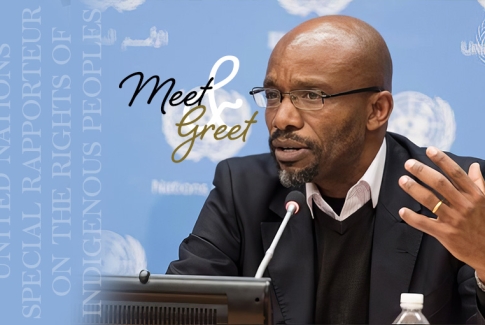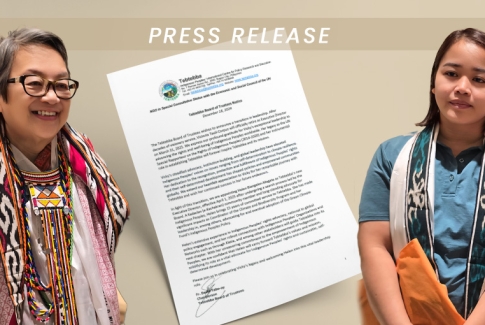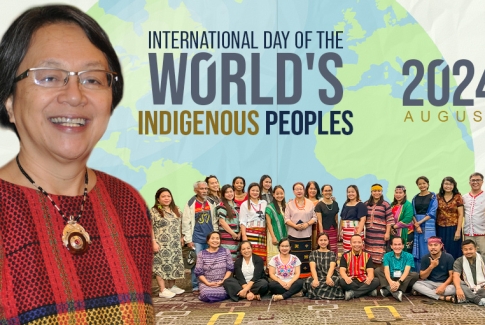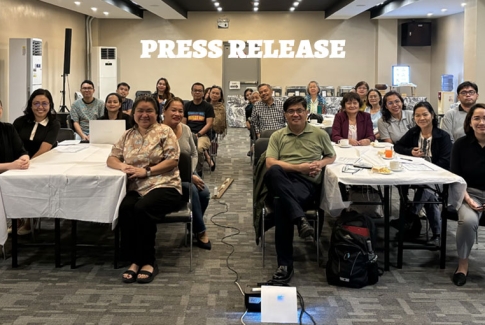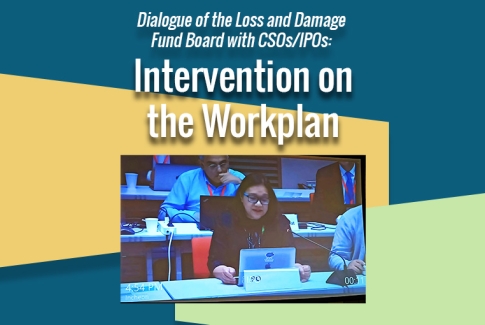New York, New York: On January 20th, 2025, the International Indian Treaty Council (IITC) will host two “Meet and Greet” webinars with the new United Nations Special Rapporteur on the Rights of Indigenous Peoples, Albert K. Barume. Co-sponsors include the Indigenous Livelihood Enhancement Partners (ILEPA, Kenya), Center for Support of Indigenous Peoples of the North/Russian Indigenous Training Center, Center for Indigenous Peoples' Research and Development (CIPRED, Nepal), and Tebtebba Foundation. The webinars will provide the new Special Rapporteur, currently based in the Democratic Republic of Congo, with an opportunity to initiate contacts, consult on his plans and seek views from Indigenous Peoples including on studies, country visits, and key issues impacting their rights worldwide. He will also respond to questions, concerns and comments from participants.
After an opening statement by Special Rapporteur Barume, who will begin his first three- year term in this role on January 1, 2025, and introductory comments by the host and co-sponsor organizations, the webinars will be conducted in a dialogue format between the Special Rapporteur and participants.
Albert Barume became well known to IITC and other international Indigenous Peoples organizations during 2015-2018 when he served as a member of the United Nations Expert Mechanism on the Rights of Indigenous Peoples (EMRIP). As EMRIP’s Chairperson-Rapporteur in 2016 he presided over the process of revising and strengthening EMRIP’s mandate as called for the by 2014 World Conference on Indigenous Peoples outcome document. The new mandate produced greater independence for this important body to address the rights of Indigenous Peoples and resulted in the establishment of the EMRIP’s Country Engagement mechanism to support implementation by States of the UN Declaration on the Rights of Indigenous Peoples.
The EMRIP’s Country Engagement process resulted in the repatriation of the sacred Yaqui Masso Kova (ceremonial deer head) to the Yaqui Nation from the Swedish Museum of Ethnography in Stockholm in 2013, among other important outcomes. IITC’s Executive Director Andrea Carmen, stated that “Albert Barume, as an expert member and Chair of the EMRIP, demonstrated an unwavering commitment to the rights of Indigenous Peoples regarding repatriation of our sacred items and human remains, based on Articles 11 and 12 of the UN Declaration. This included active engagement with UNESCO on behalf of the EMRIP to create an international repatriation mechanism, which we have yet to realize. IITC hopes that he will continue to engage in this ongoing effort, along with other urgent matters impacting our rights.”
Kimaren ole Raimit, Executive Director and Founder of ILEPA in Kenya, shared the importance of Albert’s appointment from the perspective of Indigenous Peoples of Africa. “This is the first time that we have seen the appointment of an expert from Africa in this role. We are encouraged by Albert’s strong advocacy for the distinct rights of Indigenous Peoples during his 10 years of work with the African Commission on Human and Peoples’ Rights, as well as his background as a legal expert and scholar on land rights and “conservation” in Africa. We look forward to his continued commitment, following up on the important work of former Special Rapporteur Francisco Cali Tzay, to address the specific and pervasive human rights violations impacting Indigenous Peoples caused by the imposition of “protected areas”, national parks and UNESCO World Heritage Sites, also tied to the emerging carbon market, which are resulting in forced removals of Indigenous Peoples in Africa and around the world.”
To enable broad participation by Indigenous Peoples from all seven regions they will be held at two different times for two hours each on January 20th. Interpretation will be provided in English, Spanish, French, Russian and Portuguese as noted below. Links for advance registration, required for participation, are included below.
Webinar #1: January 20th, focusing on the Asia/Pacific/Africa/Russia regions: 9:00 AM CET / 11:00 AM EAT/ 4:00 PM PHT/ 9:00 PM NZDT. Russian, English and French interpretation provided. Registration link: https://us02web.zoom.us/webinar/register/WN_gqEx_3rcSViM63znV6qBPQ
Webinar #2: January 20th, focusing on the Americas (North, South and Central), Caribbean/Europe and Arctic regions: 9:00 AM PST / 12:00 PM EST / 5:00 PM UTC. English, Spanish and Portuguese interpretation provided. Registration link: https://us02web.zoom.us/webinar/register/WN_-MlTzowxQUGjpUYVRt3Aqg
###
For more information contact R. Borrero, IITC Communications Coordinator at This email address is being protected from spambots. You need JavaScript enabled to view it.


